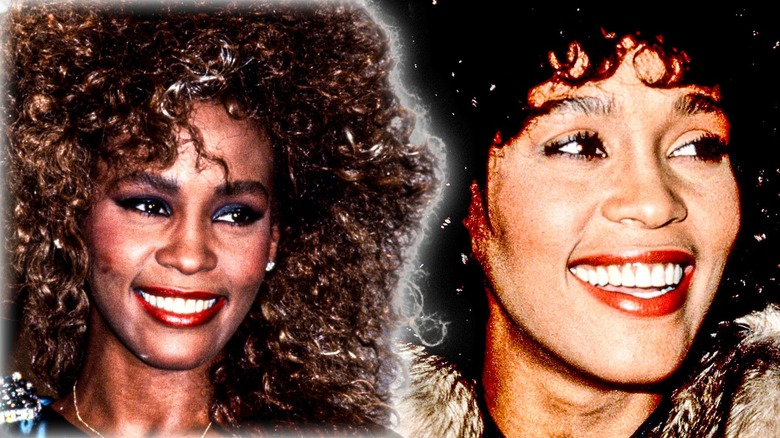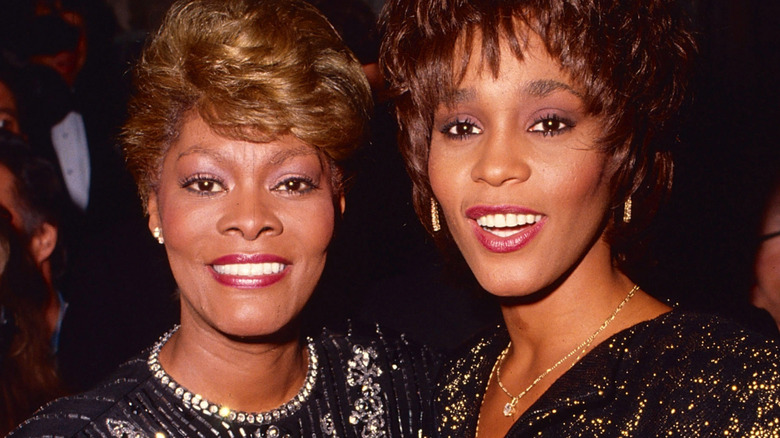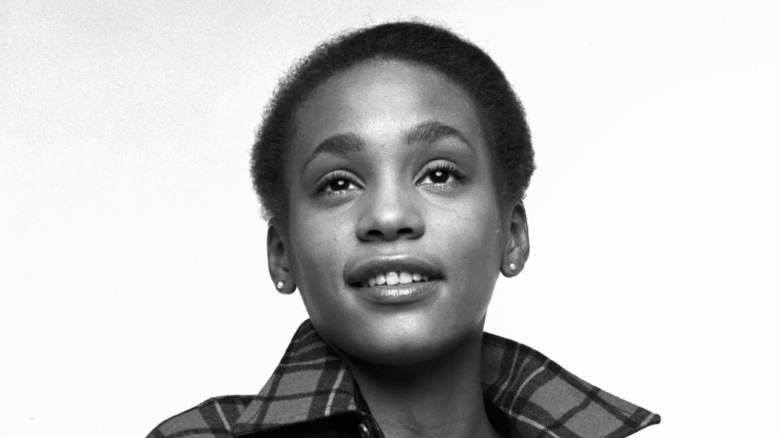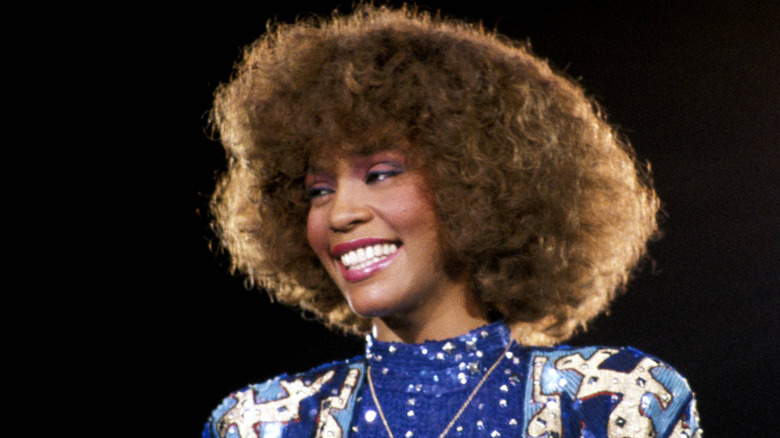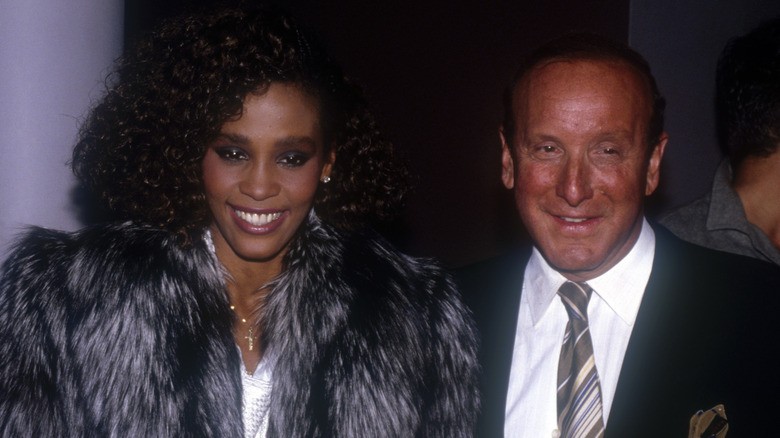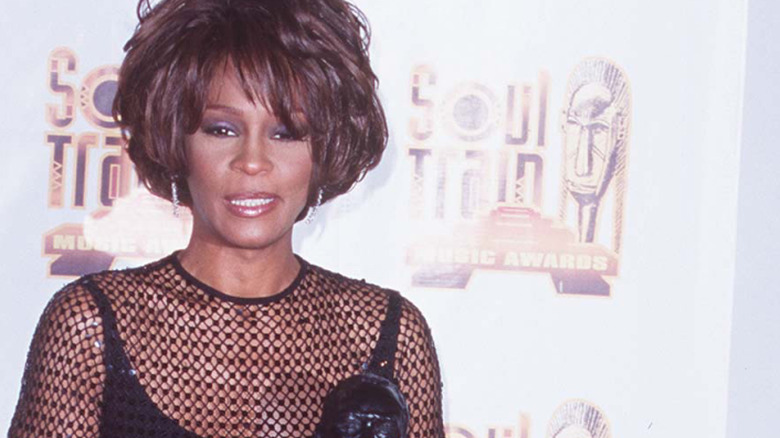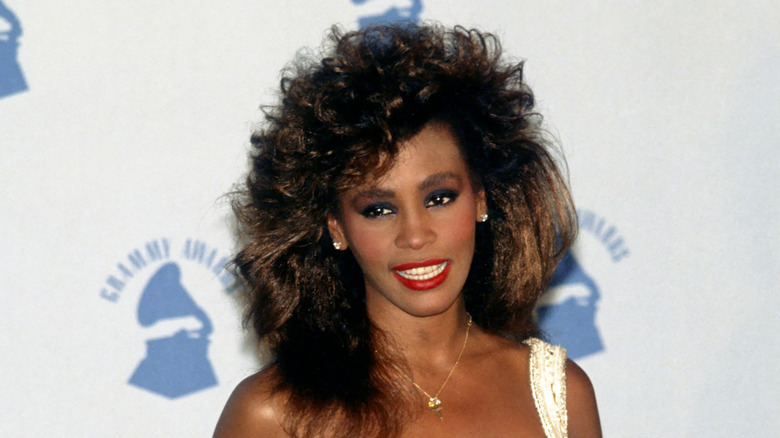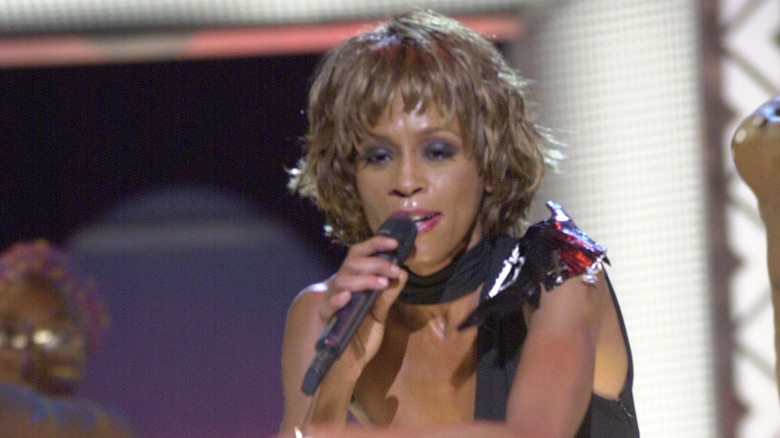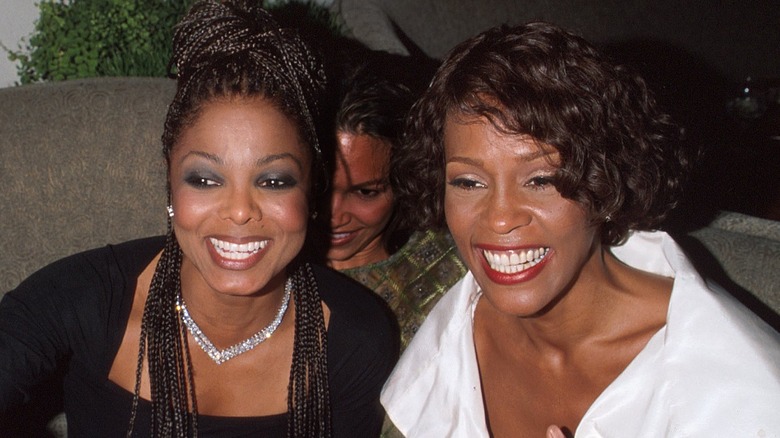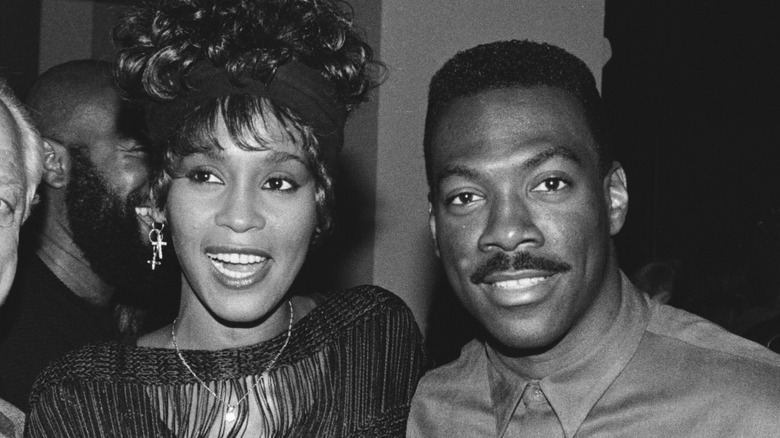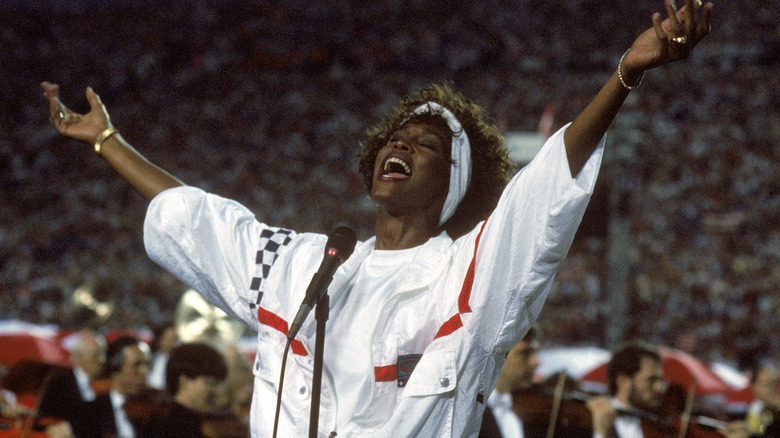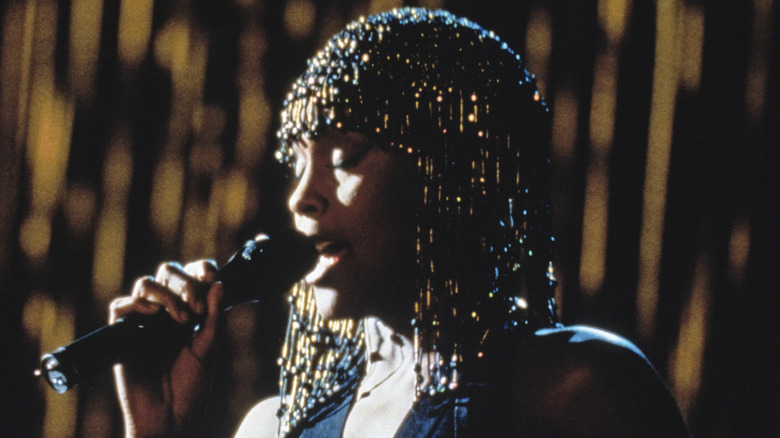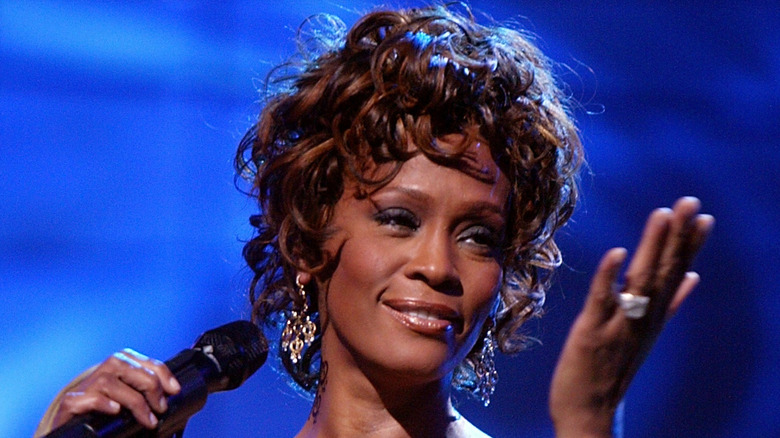The Hidden Truth Of Whitney Houston
There weren't many singers in the late 20th century more popular or talented than Whitney Houston. Emerging as a preternaturally gifted performer with a huge voice and tons of charisma, she was equally skilled at belting out slow love songs like "Saving All My Love for You" and "Didn't We Almost Have it All," as well as giddy pop bangers like "I Wanna Dance with Somebody" and "So Emotional." When Houston moved into movie star mode with "The Bodyguard" in the 1990s, she became an even bigger cultural force, with soundtrack cuts like "I Will Always Love You" becoming all-time classics.
Despite being one of the most famous and followed people in the world for many years, not much was publicly known about Houston. She was an otherworldly impressive interpreter of pop and R&B songs and epic ballads, and she was just as known for her headline-grabbing relationship history. But beyond that, Whitney Houston lived a magnificent, fascinating, and one-of-a-kind life. Here's a look into the true story of America's inscrutable queen of pop, Whitney Houston.
Whitney Houston is related to many other major female singers
Whitney Houston's first flirtations with fame came when she was only in her late teens, but by that time she'd developed her talents in the presence of some of the most famous and influential female vocalists around. Houston's early public singing performances took place at New Hope Baptist Church in Newark, New Jersey, where the musical director was her mother, Cissy Houston, a Grammy-winning gospel music icon. Cissy released numerous solo albums of religious and secular material, and also sang with the groups The Gospelaires and The Sweet Inspirations. Another member of the New Hope choir was Houston's cousin Dionne Warwick, a music icon discovered by Burt Bacharach and a member of the sometimes controversial Rock and Roll Hall of Fame.
The circle of top-shelf singers is a small one, and the Houstons had a few very famous family friends. Aretha Franklin met Houston during the latter's childhood, but was not, as Warwick claimed at Houston's funeral, her godmother. Houston's actual godmother was Darlene Love, the voice behind multiple '60s soul-pop girl groups like The Blossoms and The Crystals.
She was a successful model before she was a singer
Whitney Houston's first real touch of celebrity came in 1980, when she was discovered at New York's iconic Carnegie Hall. Houston wasn't performing there; the 16-year-old was attending an event, and a representative of the Click Model Management agency simply noticed her. While Houston's mother had prevented her from signing a record deal back when she was 14 years old (she urged her daughter to finish her education before she followed any career pursuit), this time the move was allowed, and Houston entered into the world of professional modeling.
In addition to gracing sewing pattern packages, Houston was photographed for fashion pieces and featured in many leading women's magazines of the era, including "Young Miss," "Glamour," "Cosmopolitan," "Mademoiselle," and "Seventeen." She appeared on the cover of the latter's November 1981 issue, making her one of the first Black women to be featured on that periodical.
Whitney Houston was almost a Huxtable
In the early 1980s, comedian, actor, and producer Bill Cosby was casting his return to primetime television, "The Cosby Show," a sitcom about the Huxtables, a doctor and a lawyer and their five children. Whitney Houston, not yet a professional singer, wanted to be an actor at the time, and auditioned for the series. She won the role of the second-oldest daughter, teenage hipster Denise Huxtable.
But when it came time to sign a contract, which would lock her into "The Cosby Show" for a minimum of five seasons, Houston suddenly had a change of heart. Jay Sandrich, who directed 100 episodes of "The Cosby Show," told the Television Academy Foundation of his interaction with Houston, saying, "This girl we brought back from New York said to me, 'I can't sign this contract and I said 'why?' She said, 'Well I want to be a singer.'" She figured that starring on a weekly sitcom would prevent her from pursuing her burgeoning musical career, even though she hadn't yet landed a record deal.
Her career was very slowly and carefully curated
Whitney Houston was just 19 years old when she decided to perform publicly outside of church. In 1983, when she sang with her mother at Sweetwater's, a nightclub in New York City, Arista Records founder and president Clive Davis was in attendance, and he quickly signed Houston to a recording contract. Rather than rush to get an album written, recorded, and released, Davis opted to slowly introduce what he considered a special prospect. He booked her to sing "Home" from the Broadway musical "The Wiz" on an episode of "The Merv Griffin Show" in 1983, and landed her guest-star gigs on "Gimme a Break!" and "As the World Turns."
Houston made her debut in commercially released music in 1984, duetting with soul star Terry Pendergrass on the R&B hit "Hold Me." Davis wasn't ready to release Houston's first album until 1985. From the time of her discovery to the launch of the "Whitney Houston" LP, Davis and associates spent nearly two years selecting just the right songs; some pop, some R&B, and some adult contemporary.
Whitney Houston was accused of abandoning her Black fans
One moment can destroy a musician's career, and Whitney Houston narrowly avoided such a fate. Houston's talent and fame were incubated in historically Black musical forms; she grew up singing gospel in a church choir, and her first major musical release was a duet with R&B hitmaker Terry Pendergrass. But when her albums actually came out, 1985's "Whitney Houston" and 1987's "Whitney," they were loaded not with gospel-influenced R&B or modern soul, but crisply produced ballads made for the adult contemporary market. Some fans decided that Houston had seemingly turned her back on the Black culture that had promoted her rise to stardom, and they made their feelings known during the 1988 Soul Train Awards. When Anita Baker read off the nominees for "Best Music Video," the crowd screamed and clapped with delight for all of the nominees, but not so much when "Whitney Houston, 'I Wanna Dance with Somebody,'" was announced. Some members of the audience even booed.
Houston reflected on the moment and defended herself on "The Arsenio Hall Show" in 1991. "I got a lot of flak about I sing too white. I think that maybe that's where it comes from," she said (via Smithsonian). "I do sing the way God intended for me to sing and I'm using what he gave me and I'm using it to the best of my ability."
She set a lot of records
Some Guinness World Records are nearly impossible to beat, perhaps among them ones held by Whitney Houston. She sold so many highly regarded albums and singles that she's included in the Guinness World Records rolls as the most individually awarded female artist ever, winning more than 400 honors, including six Grammy Awards. Between 1985 and 1988, Houston released six singles that back-to-back all hit No. 1 in the U.S., a record for consecutive chart-toppers. In the midst of that streak, Houston's second LP, "Whitney," debuted at No. 1 on the Billboard album chart, which was the first time a female musician ever achieved such a feat. She's the only act to ever release eight straight multi-million-selling albums, which include some of the most bought LPs from individual genres. Her soundtrack to the movie "The Preacher's Wife" is the best-selling gospel album in American history, while the Houston-dominant companion to "The Bodyguard" is the top-selling movie soundtrack. No female artist has ever sold more copies of a single than Houston did of that album's major hit, "I Will Always Love You."
In 2001, Arista Records gave Houston her financial due, signing her to a $100 million recording contract, the most lucrative ever to that point. In 2023, more than a decade after her death, Houston and her music remained quite popular. She was Forbes' highest-grossing deceased celebrity, with her estate earning around $30 million in one year.
Whitney Houston could've had even more hits
Over the span of her career, Whitney Houston took 11 singles to the No. 1 spot on the American pop chart. Only eight other acts have accumulated more chart-toppers, and it's entirely possible that Houston could have gone to No. 1 a few more times, as several songs she didn't get to record went on to become huge hits for others. When Michael Jackson was prepping "Bad," the 1987 follow-up to his monster blockbuster "Thriller," he wanted a big name to be his duet partner on what would be the record's leadoff single, "I Just Can't Stop Loving You." Barbra Streisand said no, and Houston wasn't permitted to participate. Clive Davis, chief of her label Arista Records, thought it would overexpose Houston when she was about to release her own new album, and that Jackson's Epic Records wouldn't pay enough for Houston's services.
In the late 1980s, prolific hit songwriter Diane Warren wrote the forlorn ballad "Love Will Lead You Back" during a vacation to Russia. "I actually had it in mind for Whitney," Warren said in "The Billboard Book of Number One Hits." She recorded a demo, and played it for Davis. "He was really moved by it and said, 'I want that song.'" But he wanted it not for Houston, but for Arista artist Taylor Dayne. In early 1990, Dayne's recording became the only No. 1 hit of her career.
Whitney Houston sang some songs written for others
Released in 1985, Whitney Houston's first, eponymous album spawned three No. 1 hit singles, but the only one that wasn't a big-voiced love ballad was the bubbly dance-pop song "How Will I Know." It also wasn't originally intended for her. Married songwriting team George Merrill and Shannon Rubicam, who'd have their own smash hit in 1988 with "Waiting for a Star to Fall" under the name Boy Meets Girl, were staff writers for A&M Records and delivered "How Will I Know" when asked to compose material specifically for Janet Jackson. That singer's team rejected it, and Merrill and Rubicam's songwriting publisher played it for Arista Records R&B department representative Gerry Griffith, who sent it along to company head Clive Davis, who earmarked it for inclusion on the debut album of his protégé, Houston.
In 1998, Houston took the mid-tempo hip-hop ballad "Heartbreak Hotel" to No. 2 on the pop chart and No. 1 on the R&B chart. Her gain was TLC's loss. Producers Soulshock and Karlin wrote the song and presented it to Davis, who loved it and acquired it for an Arista artist. Houston invited the duo to record the song at her home studio in New Jersey, edging out interested label-mate TLC for the privilege, just one of the many messed-up truths about the 1990s music industry.
She was in a love triangle with two of the biggest stars of the '80s
For decades, Whitney Houston was one half of a high-profile celebrity relationship. In 1989, the mega-famous singer attended the Soul Train Awards and met R&B star Bobby Brown, who was at the time breaking out with a solo career after many years in the group New Edition. She tried flirting, but he wasn't interested until they reconnected at her birthday party and later a concert. Houston dropped whoever she was seeing at the time for Brown, and after she rejected Brown's initial marriage proposal, they wound up getting married in July 1992. The relationship proved consistently tumultuous: they fought on their honeymoon, Brown allegedly physically abused Houston on multiple occasions, and both admitted to frequent substance abuse. Houston filed for divorce in 2006.
But back when Houston first started seeing Brown romantically in 1989, she was entangled with another famous person. "She was more interested in Eddie Murphy, but he was elusive," Houston's friend and associate Robyn Crawford wrote in "A Song for You: My Life with Whitney Houston" (via People). Murphy wouldn't show up for dates with Houston, upsetting the singer. They'd long since parted ways, but Murphy still phoned Houston the morning of her wedding to Brown. "Eddie Murphy called to say she was making a mistake," Crawford said.
Whitney Houston turned The National Anthem into a hit song
The NFL enlisted Whitney Houston to sing "The Star Spangled Banner" before the start of the 1991 Super Bowl, held just after the beginning of Operation Desert Storm, a U.S. military intervention in Kuwait. Houston worked with her musical director Ricky Minor and arranger John Clayton Jr. to create a fresh take on the song, inspired by Marvin Gaye's soul-infused version performed at the 1983 NBA All-Star Game. "Marvin used a drum machine that made it four, four," Minor told NBC's "Today." "She asked, 'Is there any way we can have a little more time like he did?'"
Both the NFL and broadcaster CBS were hesitant about such a radically different national anthem, but were persuaded after Houston swiftly made a sample recording. "She never heard it until she sang it for the pre-record," Minor said. "That is pretty much that first take and her first time hearing it." The version that went out across Tampa Stadium and the airwaves was a mix of the recorded version and Houston singing live. The rapturous reception led Arista Records to release it as a single, and Gulf War-related patriotism fueled the song's rise to No. 20 on the Billboard Hot 100, the first time in the history of "The Star-Spangled Banner" that it stormed the charts. In the aftermath of the terrorist attacks of September 11, 2001, Houston's interpretation hit No. 6 on the pop chart.
There are lots of unmade Whitney Houston movies
After close to a decade of musical success, Whitney Houston gave film acting a try. She starred opposite Kevin Costner in the romantic thriller "The Bodyguard" as a pop star in danger, and the 1992 film was such a blockbuster — it earned $411 million at the global box office — that Hollywood set about turning Houston into a proper movie star. While she'd ultimately only star in three big-screen projects across the rest of her life ("Waiting to Exhale," "The Preacher's Wife," and "Sparkle"), many other movies built around Houston failed to transpire.
In 1993, pre-production began on a remake of "A Star is Born," to feature Houston as a musical up-and-comer who falls in love with her mentor, an established star set to be played by Denzel Washington or Wesley Snipes. Houston's managers — her father, and close friend Robyn Crawford — turned down the initial screenplay because it contained too many curse words. It never got made, nor did another project Houston was circling, a movie about a singer and songwriter falling in love called "Serenade." Instead of those movies or others briefly under consideration, including a drama about a young singer who becomes a star in New York City and a project about a gospel singer in a little town, Houston ultimately followed up "The Bodyguard" with "Waiting to Exhale" in 1995.
A lost recording was made into Houston's final, posthumous hit single
Whitney Houston recorded a more R&B-forward version of Steve Winwood's 1986 rock pop-rock hit "Higher Love" for inclusion on her third album, 1990's "I'm Your Baby Tonight." Producer Narada Michael Walden completed the track and sent it off to Arista Records boss Clive Davis for approval — who nixed it. "We didn't want her being a cover artist at the time," Davis told Rolling Stone. Houston's "Higher Love" was barely shared with the public, included as a bonus track on "I'm Your Baby Tonight" in Japan only.
A highly sought-after rarity for Houston fans and catalog completists, the song remained hard to find for nearly three decades. In 2019, the late Houston's sister-in-law and estate executor Pat Houston decided that the time was right to finally formally release "Higher Love." "The current cultural environment has been thirsty for something uplifting and inspiring," Pat Houston said. Rather than just release the 1990 recording as it was, the estate and Arista successor RCA Records commissioned producer and remixer Kygo to do something with Houston's vocals. The result was a synths and horns-heavy dance-pop version showcasing Houston's voice. The song landed on multiple Billboard charts seven years after Houston's death, giving the singer one final, posthumous hit.
